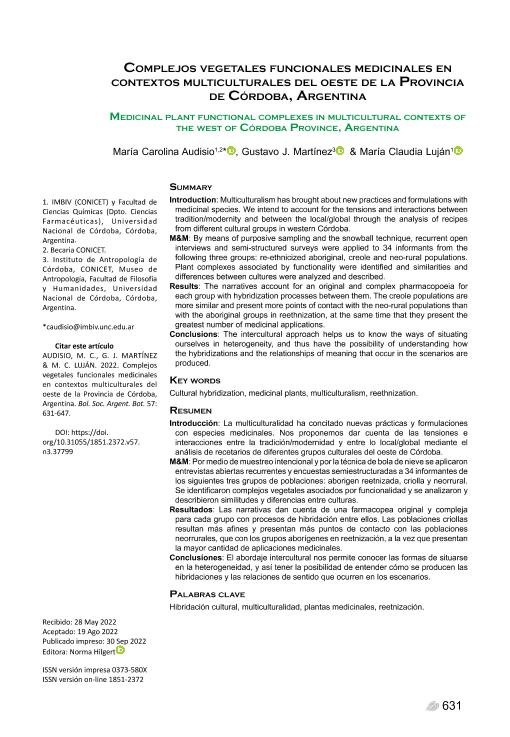Artículo
La multiculturalidad ha concitado nuevas prácticas y formulaciones con especies medicinales. Nos proponemos dar cuenta de las tensiones e interacciones entre la tradición/modernidad y entre lo local/global mediante el análisis de recetarios de diferentes grupos culturales del oeste de Córdoba. Por medio de muestreo intencional y por la técnica de bola de nieve se aplicaron entrevistas abiertas recurrentes y encuestas semiestructuradas a 34 informantes de los siguientes tres grupos de poblaciones: aborigen reetnizada, criolla y neorrural. Se identificaron complejos vegetales asociados por funcionalidad y se analizaron y describieron similitudes y diferencias entre culturas. Las narrativas dan cuenta de una farmacopea original y compleja para cada grupo con procesos de hibridación entre ellos. Las poblaciones criollas resultan más afines y presentan más puntos de contacto con las poblaciones neorrurales, que con los grupos aborígenes en reetnización, a la vez que presentan la mayor cantidad de aplicaciones medicinales. Conclusiones: El abordaje intercultural nos permite conocer las formas de situarse en la heterogeneidad, y así tener la posibilidad de entender cómo se producen las hibridaciones y las relaciones de sentido que ocurren en los escenarios. Multiculturalism has brought about new practices and formulations with medicinal species. We intend to account for the tensions and interactions between tradition/modernity and between the local/global through the analysis of recipes from different cultural groups in western Córdoba. By means of purposive sampling and the snowball technique, recurrent open interviews and semi-structured surveys were applied to 34 informants from the following three groups: re-ethnicized aboriginal, creole and neo-rural populations. Plant complexes associated by functionality were identified and similarities and differences between cultures were analyzed and described. The narratives account for an original and complex pharmacopoeia for each group with hybridization processes between them. The creole populations are more similar and present more points of contact with the neo-rural populations than with the aboriginal groups in reethnization, at the same time that they present the greatest number of medicinal applications. The intercultural approach helps us to know the ways of situating ourselves in heterogeneity, and thus have the possibility of understanding how the hybridizations and the relationships of meaning that occur in the scenarios are produced.
Complejos vegetales funcionales medicinales en contextos multiculturales del oeste de la Provincia de Córdoba, Argentina
Título:
Medicinal plant functional complexes in multicultural contexts of the west of Córdoba Province, Argentina
Fecha de publicación:
11/2022
Editorial:
Sociedad Argentina de Botánica
Revista:
Boletín de la Sociedad Argentina de Botánica
ISSN:
0373-580X
e-ISSN:
1851-2372
Idioma:
Español
Tipo de recurso:
Artículo publicado
Clasificación temática:
Resumen
Palabras clave:
Hibridación Cultural
,
Multiculturalidad
,
Plantas medicinales
,
Reetnización
Archivos asociados
Licencia
Identificadores
Colecciones
Articulos(IMBIV)
Articulos de INST.MULTIDISCIPL.DE BIOLOGIA VEGETAL (P)
Articulos de INST.MULTIDISCIPL.DE BIOLOGIA VEGETAL (P)
Citación
Audisio, María Carolina; Luján, María Claudia; Martínez, Gustavo Javier; Complejos vegetales funcionales medicinales en contextos multiculturales del oeste de la Provincia de Córdoba, Argentina; Sociedad Argentina de Botánica; Boletín de la Sociedad Argentina de Botánica; 57; 3; 11-2022; 1-10
Compartir




